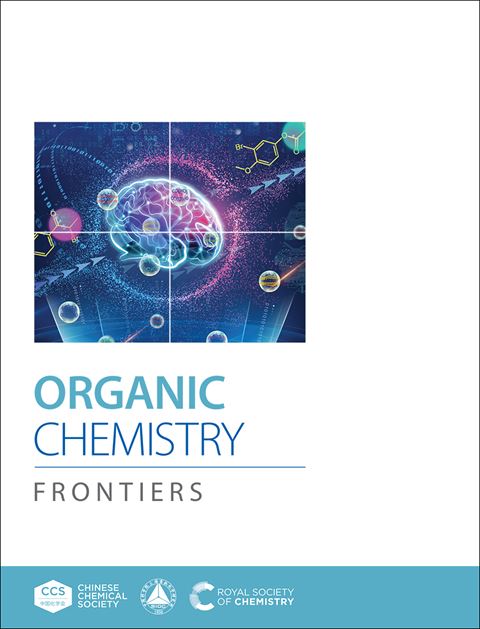路易斯酸催化双环[1.1.0]丁烷和醌的发散环化合成各种多环分子
IF 4.7
1区 化学
Q1 CHEMISTRY, ORGANIC
引用次数: 0
摘要
双环[1.1.0]丁烷已经被利用在一个发散的路易斯酸催化平台上,以获得各种多环结构。通过调整反应条件,选择性地得到了多种双环[2.1.1]己烷、螺环丁烯-苯并呋喃-2(3H)-酮和四氢环丁烯[b]苯并呋喃。特别是,当使用Sc(OTf)₃作为催化剂时,吡唑取代的bcb在二氯甲烷中与醌有效地进行形式(3+2)环加成反应,产生高取代的双环[2.1.1]己烷。值得注意的是,当四氯化碳作为溶剂时,吡唑被消除,螺环丁烯-苯并呋喃-2(3H)-化合物被生成。另一方面,当双取代BCB酯在催化量的Bi(OTf)3和一个当量的二苯基磷酸存在下与醌反应时,会发生串联异构化-(3+2)环加成反应,导致选择性合成四氢环丁基[b]苯并呋喃产品。初步证实了催化合成双环[2.1.1]己烷的不对称变体。本文章由计算机程序翻译,如有差异,请以英文原文为准。
Lewis Acid Catalyzed Divergent Annulation of Bicyclo[1.1.0]butanes and Quinones for the Synthesis of Various Polycyclic Molecules
Bicyclo[1.1.0]butanes have been harnessed in a divergent Lewis acid catalytic platform to access various polycyclic architectures. A variety of bicyclo[2.1.1]hexanes, spiro-cyclobutene-benzofuran-2(3H)-ones and tetrahydrocyclobuta[b]benzofurans were selectively accessed by tuning the reaction conditions. In particular, when Sc(OTf)₃ is employed as a catalyst, pyrazole-substituted BCBs efficiently carry out formal (3+2) cycloaddition reactions with quinones in dichloromethane, producing highly substituted bicyclo[2.1.1]hexanes. Remarkably, pyrazoles were eliminated and spiro-cyclobutene-benzofuran-2(3H)-ones were produced when carbon tetrachloride was employed as the solvent. On the other hand, a tandem isomerization-(3+2) cycloaddition occurs when disubstituted BCB esters react with quinones in the presence of catalytic quantities of Bi(OTf)3 and one equivalent of diphenyl phosphate, resulting in the selective synthesis of tetrahydrocyclobuta[b]benzofuran products. A preliminary catalytic asymmetric variant for the synthesis of bicyclo[2.1.1]hexanes has also been demonstrated.
求助全文
通过发布文献求助,成功后即可免费获取论文全文。
去求助
来源期刊

Organic Chemistry Frontiers
CHEMISTRY, ORGANIC-
CiteScore
7.90
自引率
11.10%
发文量
686
审稿时长
1 months
期刊介绍:
Organic Chemistry Frontiers is an esteemed journal that publishes high-quality research across the field of organic chemistry. It places a significant emphasis on studies that contribute substantially to the field by introducing new or significantly improved protocols and methodologies. The journal covers a wide array of topics which include, but are not limited to, organic synthesis, the development of synthetic methodologies, catalysis, natural products, functional organic materials, supramolecular and macromolecular chemistry, as well as physical and computational organic chemistry.
 求助内容:
求助内容: 应助结果提醒方式:
应助结果提醒方式:


